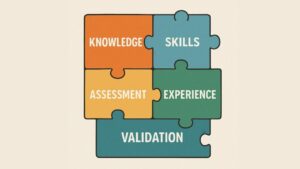 ISO/IEC 17025 applies to laboratories performing testing and calibration activities. Clauses 7.6 and 7.7 work together to ensure that laboratory results are both technically valid and consistently reliable.
ISO/IEC 17025 applies to laboratories performing testing and calibration activities. Clauses 7.6 and 7.7 work together to ensure that laboratory results are both technically valid and consistently reliable.
Clause 7.6 focuses on measurement uncertainty, requiring laboratories to understand and evaluate factors that influence measurement results. Clause 7.7 addresses ensuring the validity of results, requiring laboratories to monitor performance over time using both internal and external checks.
Together, these clauses support confidence—in laboratory data, laboratory processes, and laboratory competence.
Clause 7.6: Measurement Uncertainty
What Is Measurement Uncertainty?
Measurement uncertainty is an expression of the doubt that exists in any measurement result. No measurement is exact, and ISO/IEC 17025 requires laboratories to understand what affects their results and how significant those effects are.
Clause 7.6 requires laboratories to:
- Identify significant contributors to measurement uncertainty
- Evaluate uncertainty using appropriate methods
- Apply uncertainty evaluation consistently with laboratory activities
The intent is not perfection but understanding.
Identifying Contributors to Uncertainty
Uncertainty contributors can arise from many sources, including:
- Reference standards
- Equipment resolution
- Repeatability of measurements
- Environmental conditions such as temperature or humidity
- Equipment drift over time
- Sampling, when applicable
Not every possible contributor must be included—only those that significantly affect the measurement result. The evaluation should be appropriate to the measurement being carried out.
Type A and Type B Uncertainty
Uncertainty contributors are commonly categorized as Type A or Type B.
- Type A uncertainty is evaluated using statistical methods, such as repeated measurements and calculation of standard deviation.
- Type B uncertainty is evaluated using non-statistical information, including calibration certificates, manufacturer specifications, reference materials, published data, or professional judgment.
Most uncertainty budgets include a combination of both. The key is not the classification, but whether the contributor is technically justified and properly quantified.
Uncertainty Distributions
To estimate uncertainty, laboratories apply probability distributions to contributors.
Common distributions include:
- Normal distribution, often used for statistically derived (Type A) uncertainty
- Rectangular (uniform) distribution, commonly used for specifications or resolution limits
- Triangular or U-shaped distributions, used less frequently in specific cases
When uncertainty exists about which distribution applies, a rectangular distribution is often a conservative and acceptable choice when justified.
Calibration vs. Testing Laboratories
Clause 7.6 applies differently depending on laboratory activities.
- Calibration laboratories must evaluate measurement uncertainty for all calibrations, including in-house calibrations supporting testing.
- Testing laboratories must evaluate uncertainty when the test method allows. If a rigorous evaluation is not possible, a reasonable estimation based on theory or experience is required.
When recognized test methods specify how uncertainty is addressed or how results are reported, following the method correctly may satisfy the requirement.
Clause 7.7: Ensuring the Validity of Results
Clause 7.7 focuses on monitoring laboratory performance to ensure results remain valid over time. This monitoring must be planned, implemented, recorded, and reviewed.
Internal Monitoring Activities
Laboratories must use internal controls to detect trends or issues before incorrect results are reported.
Examples include:
- Use of reference materials
- Functional and intermediate equipment checks
- Replicate testing
- Control charts
- Review of results prior to release
Where practical, statistical techniques should be used, and records must demonstrate that monitoring activities are performed and reviewed.
External Monitoring and Proficiency Testing
In addition to internal monitoring, laboratories must participate in external comparisons where available and appropriate.
This includes:
- Proficiency testing programs
- Interlaboratory comparisons
These activities provide objective evidence of laboratory competence by comparing results with peer laboratories.
When proficiency testing is not available or appropriate, alternative approaches—such as intralaboratory comparison may be used, but they must be justified and documented.
Reviewing Results and Taking Action
Results from internal and external monitoring activities must be analyzed. If results fall outside acceptable criteria, laboratories are required to:
- Investigate the issue
- Implement corrective actions
- Prevent incorrect results from being reported
Monitoring activities are not simply a compliance exercise, they are a critical tool for continual improvement and confidence in laboratory performance.
Why Clauses 7.6 and 7.7 Matter
Measurement uncertainty and result validity are essential to demonstrating technical competence under ISO/IEC 17025. These clauses ensure that laboratories:
- Understand the limitations of their measurements
- Apply consistent and defensible evaluation methods
- Detect issues before they impact customers
- Build trust with accreditation bodies and clients
When applied effectively, Clauses 7.6 and 7.7 strengthen not only compliance, but the overall quality and reliability of laboratory operations.
Contact PJLA
If you have questions about ISO/IEC 17025 accreditation, measurement uncertainty, or how to implement effective systems in your laboratory, Perry Johnson Laboratory Accreditation, Inc. (PJLA) is here to help.
Phone: 1-877-369-5227 (1-877-369-LABS) or (248) 519-2603
Email: [email protected]
Website: https://www.pjlabs.com
Address: Perry Johnson Laboratory Accreditation, Inc., 755 W. Big Beaver Rd., Suite 1325, Troy, Michigan, 48084, USA pjlabs.com
PJLA provides expert accreditation services and support for laboratories seeking compliance with international standards such as ISO/IEC 17025.
 At PJLA (PJLA), we specialize in accreditation of labs and testing services, ensuring food, beverage, and consumer product safety and compliance. This Halloween, our focus turns to the treat bowl: how testing, allergen verification, and robust control help manufacturers, retailers and families enjoy the fun with confidence.
At PJLA (PJLA), we specialize in accreditation of labs and testing services, ensuring food, beverage, and consumer product safety and compliance. This Halloween, our focus turns to the treat bowl: how testing, allergen verification, and robust control help manufacturers, retailers and families enjoy the fun with confidence. In the world of accreditation, impartiality is everything. Without it, the credibility of any conformity assessment body (CAB), whether a testing or calibration laboratory, inspection agency, or certification body, quickly unravels. Yet, as PJLA’s Technical & International Business Development Manager Dr. George Anastasopoulos has observed through years of accreditation assessments, many CABs still treat impartiality as a simple compliance box to check rather than a living, breathing part of their management system.
In the world of accreditation, impartiality is everything. Without it, the credibility of any conformity assessment body (CAB), whether a testing or calibration laboratory, inspection agency, or certification body, quickly unravels. Yet, as PJLA’s Technical & International Business Development Manager Dr. George Anastasopoulos has observed through years of accreditation assessments, many CABs still treat impartiality as a simple compliance box to check rather than a living, breathing part of their management system. In his recent LinkedIn article, PJLA’s Technical & International Business Development Manager, Dr. George Anastasopoulos, reflects on why process-based auditing, though introduced with ISO 9001:2000, continues to challenge auditors/assessors more than two decades later.
In his recent LinkedIn article, PJLA’s Technical & International Business Development Manager, Dr. George Anastasopoulos, reflects on why process-based auditing, though introduced with ISO 9001:2000, continues to challenge auditors/assessors more than two decades later. Article from Dr. George Anastasopoulos
Article from Dr. George Anastasopoulos By Dr. George Anastasopoulos
By Dr. George Anastasopoulos

 We are proud to share that Dr. George Anastasopoulos is in the June 2025 edition of Quality Magazine. He is the Technical and International Business Development Manager at Perry Johnson Laboratory Accreditation, Inc. (PJLA). He titled his article “The Modified FINK Risk Analyzing Method for Conformity Assessment Bodies.” Dr. Anastasopoulos is a well-known leader in conformity assessment. He has decades of experience in laboratory accreditation, risk assessing, and quality management. His article presents a new way to evaluate risk for Conformity Assessment Bodies (CABs). It builds on the FINK model and changes it to fit the needs of accredited organizations better.
We are proud to share that Dr. George Anastasopoulos is in the June 2025 edition of Quality Magazine. He is the Technical and International Business Development Manager at Perry Johnson Laboratory Accreditation, Inc. (PJLA). He titled his article “The Modified FINK Risk Analyzing Method for Conformity Assessment Bodies.” Dr. Anastasopoulos is a well-known leader in conformity assessment. He has decades of experience in laboratory accreditation, risk assessing, and quality management. His article presents a new way to evaluate risk for Conformity Assessment Bodies (CABs). It builds on the FINK model and changes it to fit the needs of accredited organizations better. In “The Modified FINK Risk Analyzing Method for Conformity Assessment Bodies,” Dr. Anastasopoulos shares a useful method. This method helps CABs find, study, and handle operational risks. The modified model emphasizes:
In “The Modified FINK Risk Analyzing Method for Conformity Assessment Bodies,” Dr. Anastasopoulos shares a useful method. This method helps CABs find, study, and handle operational risks. The modified model emphasizes:
 Despite their importance, SMEs often encounter significant hurdles, such as limited resources and tough market competition. Accreditation can play a transformative role in helping them overcome these challenges. Through accredited conformity assessment, SMEs can demonstrate compliance with recognized standards, boost their reputation, access new markets, and gain the confidence of customers, regulators, and investors alike.
Despite their importance, SMEs often encounter significant hurdles, such as limited resources and tough market competition. Accreditation can play a transformative role in helping them overcome these challenges. Through accredited conformity assessment, SMEs can demonstrate compliance with recognized standards, boost their reputation, access new markets, and gain the confidence of customers, regulators, and investors alike.